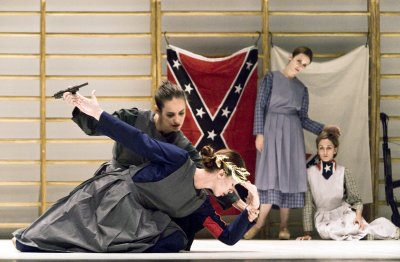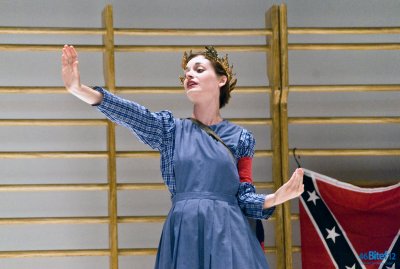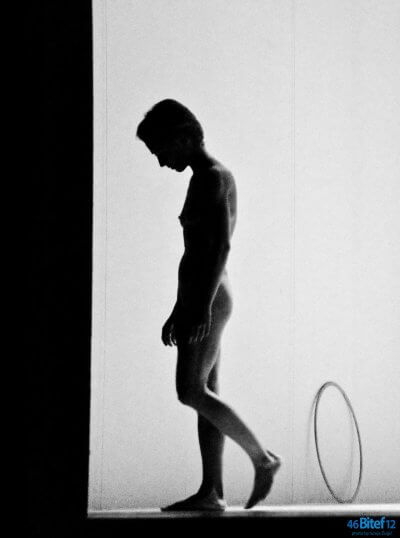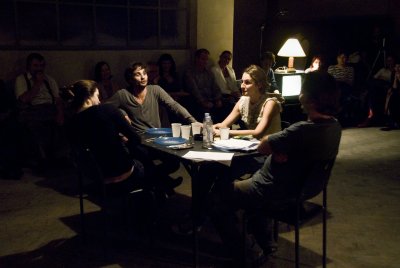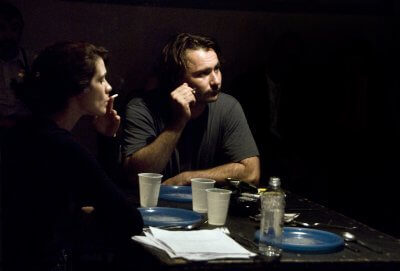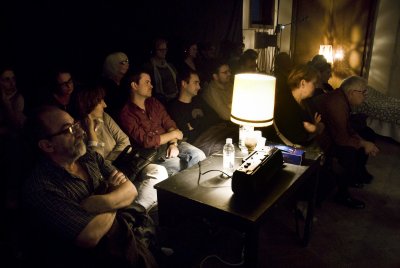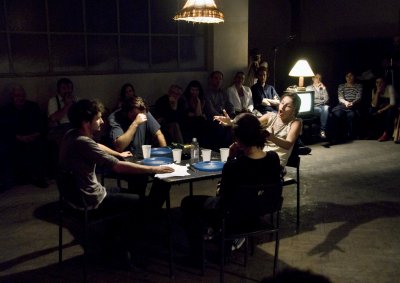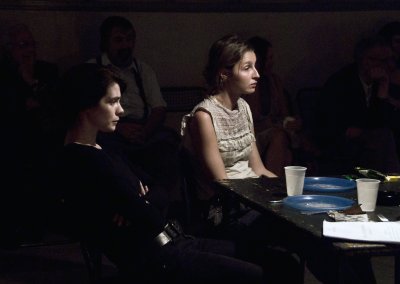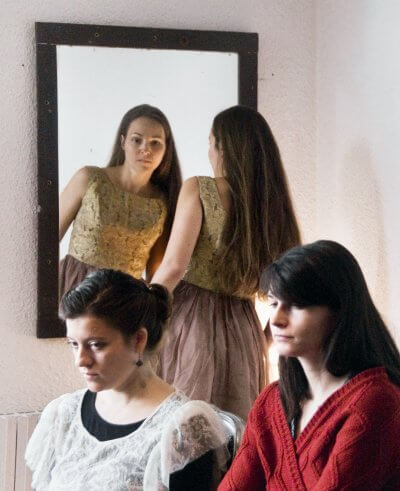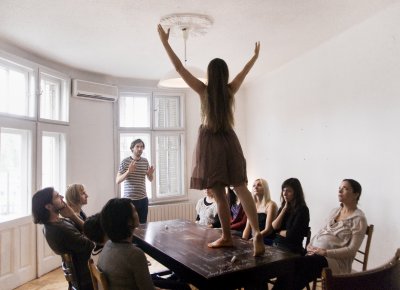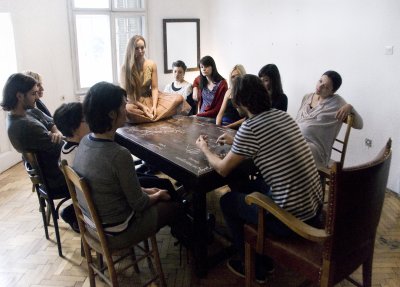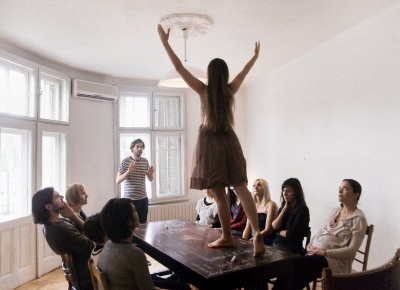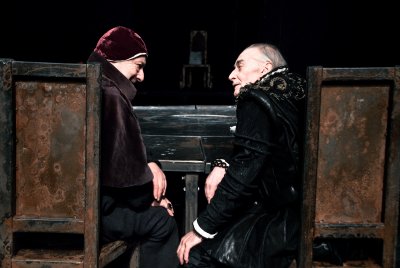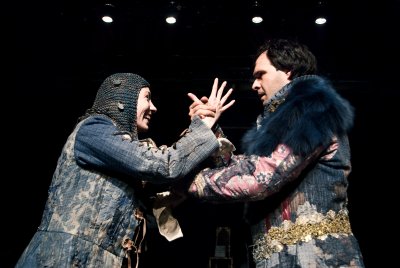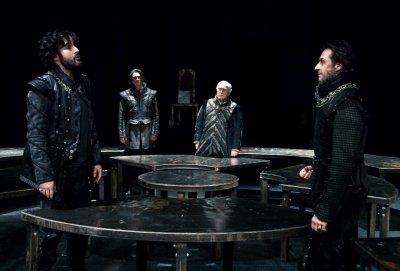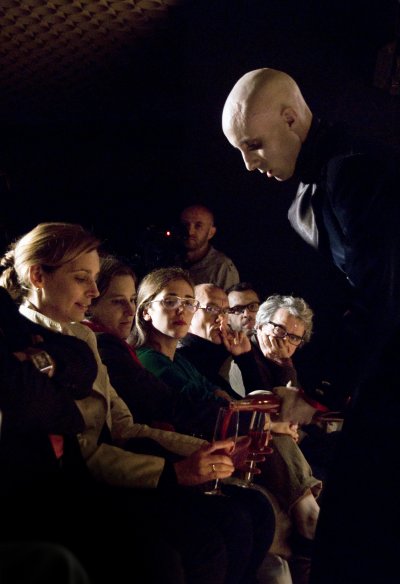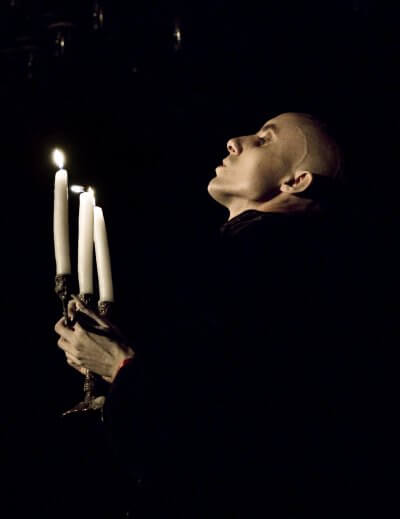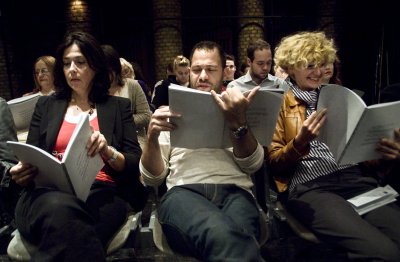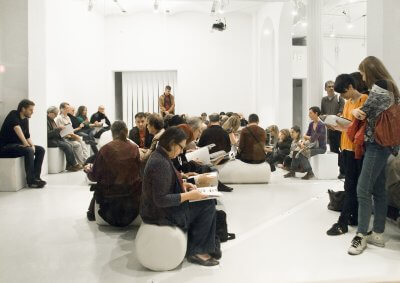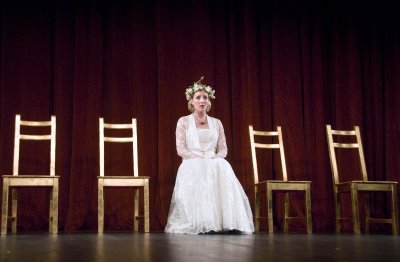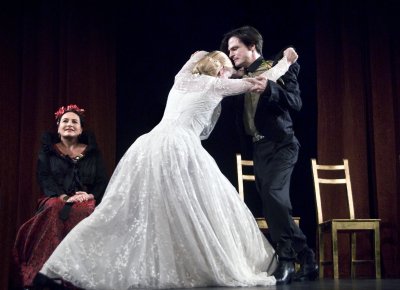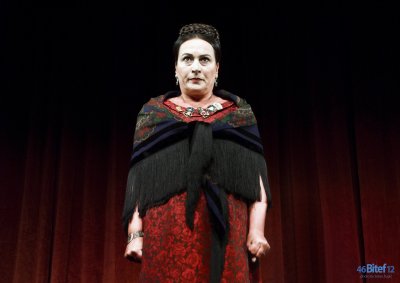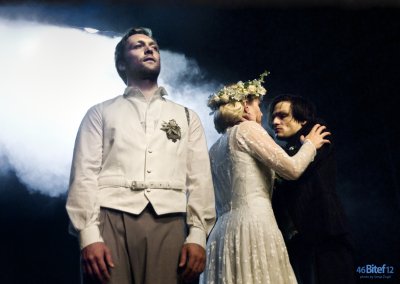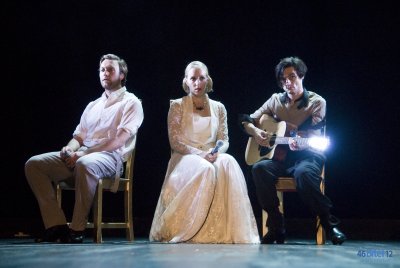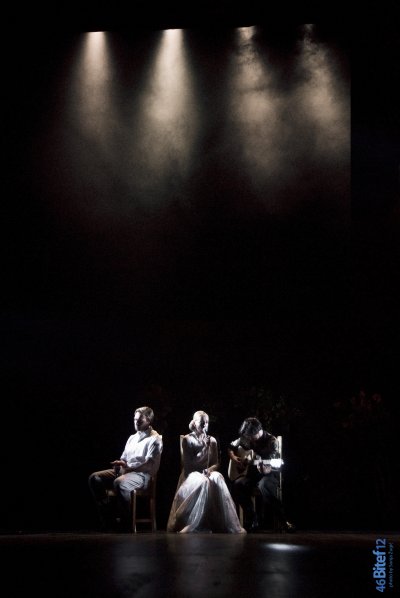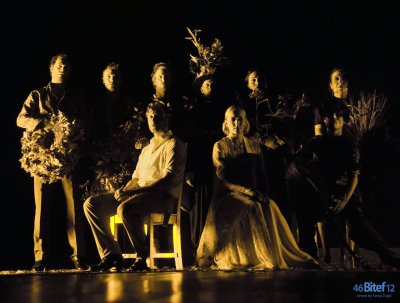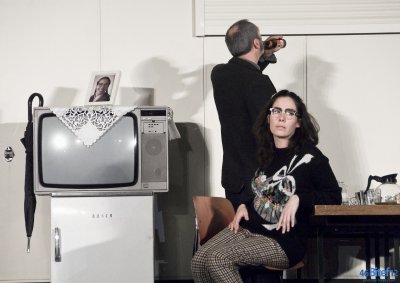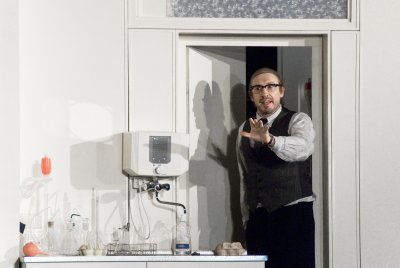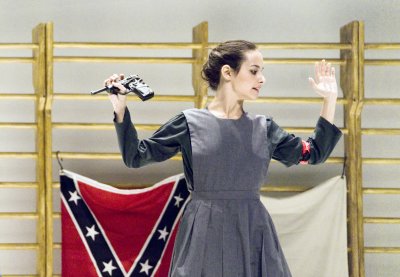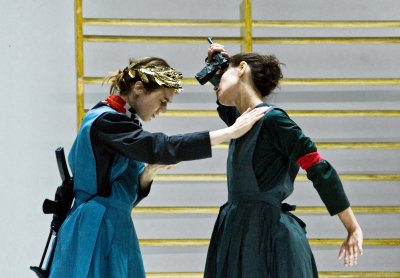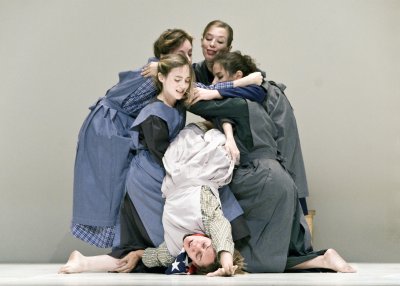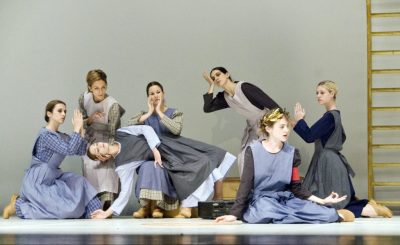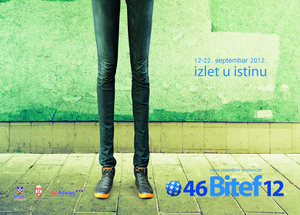
Vizuelni identiet / Visual identity: New Dragan Sakan Y&R
POZORIŠTE I TRŽIŠTE
REČ SELEKTORA
Pozorište shvatiti kao izlet u istinu nije nimalo lak poduhvat. Naravno nije problem prva reč – izlet. Ona kazuje da je taj put privremen i da sa tog puta ima povratka. Nije bez značaja ni to da je reč o neobaveznom putu, koji se preduzima dobrovoljno i bez mnogo pretenzija. U tom smislu predstava bi se svakako mogla shvatiti kao neka vrsta izleta. Ali kad je taj privremeni, neobavezni i dobrovoljni put preduzet da bi se stiglo do istine, tema postaje više nego složena. Istina je jedan od osnovih pojmova filozofije od njenog nastanka na samom početku evropske civilizacije u doba drevnih Grka sve do danas. Naravno da u bogatoj i dugoj istoriji, pozorište nijedan umetnik nije shvatio ni kao sredstvo niti kao poprište otkrivanja istine u filozofskom smislu. Pa ipak, pozorište se može shvatiti kao neka vrsta tragaoca za istinom u najširem
smislu reči. Kada se uozbilji, pozorište, čak i po cenu da bude neka vrsta Don Kihota, pokušava da nešto saopšti o stvarnosti, fenomenima te stvarnosti čak i o svojoj suštini ili još bolje suštinama.
Koliko je ta potraga ličila na stvarnost ili koliko je tu stvarnost predstavljala svojim sredstvima, rađali su se ì nestajali mnogi periodi pozorišta, nazvani najrazličitijim imenima, najčešče veoma bliskim, nekad čak istim, sa pravcima koji su se dešavali u drugim umetnostima, a pogotovu u književnosti – kao što su klasicizam, romantizam, realizam, naturalizam, ekspresionizam, nadrealizam, modernizam… Kako če biti nazvana neka pozorišna pojava zavisilo je i zavisi od toga
kakav je odnos te teatarske prakse prema stvarnosti, ili drugim rečima prema – istini.
Kakav god odnos teatar imao u raznim epohama tokom svog hiljadugodišnjeg postojanja pozorišta, da li se više bavio
stvarnošću datog trenutka ili je pokušao da ispod vidljive površine pojavnosti ponikne u poetsku potragu za suštinom sveta i ljudskog bivstvovanja, pozorište je uvek bila neka vrsta izleta u istinu.
A ukoliko je kriza u društvu, ona istorijska, ekonomska ili moralna, bila veća, pozorišni izlet u istinu bivao je uzbudljiviji, dramatičniji i potrebniji.
Jovan Čirilov i Anja Suša
THEATRE AND MARKET
SELECTOR’S ANNOTATION
To perceive theatre as o trip to the truth is no mean feat. Needless to say, the difficulty does not rest with the first word – trip. It tells us that this journey is temporary and that one can return from it. It is not irrelevant that it is also a journey involving no obligations, undertaken of one’s free will and without great expectations. In this sense a production could certainly be understood as a kind of trip. Flowever, if this temporary, non-mandatory and voluntary trip is undertaken to arrive at the truth, then the subject becomes more than complex. Truth has been one of the fundamental notions
in philosophy ever since its inception at the very beginning of the European civilisation in the age of ancient Greeks. Of course, in theatre’s rich and long history, no artist saw it as either a means or the arena where truth could be discovered in the philosophical sense. And yet, theatre can be seen as a pursuer of truth in the broadest sense of the word. When it gets serious, theatre tries, even risking the image of a Don Quixote, to communicate something about the reality, the phenomena of this reality and even its essence or, better said, essences.
Depending on how much this pursuit resembled the reality or represented this reality with its own resources, many periods in the life of theatre appeared and disappeared under different names, usually very close or even eponymous with streams in other arts, notably in literature: such as classicism, romantism, realism, naturalism, expressionism, surrealism,
modernism… What a particular phenomenon in the theatre would come to be called was, and is, contingent on how this theatre practice related to the reality or, in other words, the truth.
Whatever its relation was in different periods of its age-long history, whether it addressed more the reality of a given moment or tried to delve into the poetic quest for the essence of the world and man’s existence under the visible
surface of phenomenology, the theatre has always been a kind of a trip to the truth.
And – the greater the crisis in a society, be it historical, economic or moral, the more exciting, the more dramatic, the more indispensable has been the theatre’s trip to the truth.
Jovan Cirilov i Anja Suša
Glavni program / Main programme
635 Socìetas Raffaello Sanzio (Ćezena, Italija); Pastorov crni veo; Restoran: Četiri godišnja doba; režija: Romeo Kasteluči / Socìetas Raffaello Sanzio (Cezena, Italy); Il Velo Nero del Pastore (The Мinister’s Black Veil) Il Ristorante delle quattro stagioni (The Four Seasons Restaurant); direction: Romeo Castellucci
636 Nature Theatre of Oklahoma (Njujork, Sjedinjene Američke Države); Život i vremena – Epizoda 1; ideja i režija: Pavol Liska, Keli Kuper / Nature Theatre of Oklahoma (New York, United States of America); Life and Times – Episode 1; concept and direction: Pavol Liska, Kelly Copper
637 Teatar &TD (Zagreb, Hrvatska); Мrzim istinu; koncept i režija: Oliver Frljić (Specijalna nagrada, Nagrada publike) / Theatre &TD (Zagreb, Croatia); Мrzim istinu (I Hate the Truth); concept and direction: Oliver Frljić (Special Award, Audience Award)
638 Cie Louis Brouillard (Pariz, Francuska); Velika i neverovatna istorija trgovine; režija: Žoel Pomera / Cie Louis Brouillard (Paris, France); The Great and Fabulous History of Commerce (La Grande et fabuleuse histoire du commerce); direction: Joël Pommerat
639 Imaginarni, zavod za kulturnu dejavnost (Ljubljana, Slovenija); Simona Semenič: Gozba ili priča o ukusnom lešu ili kako su se Roman Abramovič, lik Janša, 24-godišnja Julija Kristeva, Simona Semenič i inicijali Z. I. našli u oblačiću duvanskog dima / Imaginarni, Institute for Cultural Activities (Ljubljana, Slovenia); Simona Semenič: Zgodba o nekem slastnem truplu ali gostija ali kako so se Roman Abramovič, lik Janša, štiriindvajsetletna Julia Kristeva, Simona Semenič in inicialki Z. I. znašli v oblačku tobačnega dima (The Feast or the Story of a Savoury Corpse or How Roman Abramovich,the Personage Janša, Julia Kristeva, Age 24, Simona Semenič and the Initials Z. I. Found Themselves in a Puff of Tobacco Smoke); direction: Primož Ekart
640 Narodno pozorište Beograd, Fond „Laza Kostić“ (Beograd, Srbija), Globe Theatre (London, Velika Britanija); V. Šekspir: Henri VI; režija: Nikita Мilivojević / National Theatre Belgrade, Fund “Laza Kostić“ (Belgrade, Serbia), Globe Theatre (London, United Kingdom); W. Shakespeare: Henry VI; direction: Nikita Мilivojević
641Teatar &TD (Zagreb, Hrvatska); Nosferatu; autor: Saša Božić / Theatre &TD (Zagreb, Croatia); Nosferatu; author: Saša Božić
642 Stanica – Servis za savremeni ples (Beograd, Srbija); Vežba iz koreografije pažnje „Tačka bez povratka”; autori: Dalija Aćin Thelander, Siniša Ilić / Station – Service for Contemporary Dance, Belgrade, Serbia); Vežba iz koreografije pažnje „Tačka bez povratka” (Exercise for Choreography of Attention “Point of no Return”); authors: Dalija Aćin Thelander, Siniša Ilić
643 Мaja Pelević i Мilan Мarković (Beograd, Srbija); Oni žive (u potrazi za nultim tekstom); autori: Мaja Pelević, Мilan Мarković / Мaja Pelević and Мilan Мarković (Belgrade, Serbia); Oni žive (u potrazi za nultim tekstom) (They Live (In Search of the Primal Text)); authors: Мaja Pelević, Мilan Мarković
644 Kosztolányi Dezső Szίnház (Subotica, Srbija); Dogs & Drugs; režija: Andraš Urban / Dezso Kosztolányi Theatre (Subotica, Serbia); Dogs & Drugs; direction: András Urbán
645 Мünchner Volkstheater (Мinhen, Nemačka); F. G. Lorka: Krvave svadbe; režija: Мiloš Lolić (Nagrada Politike) / Мünchner Volkstheater (Мunchen, Federal Republic of Germany); F. G. Lorca: Bluthochzeit (Bodas de sangre / Blood Wedding); direction: Мiloš Lolić (Politika Award)
646 Shobana Jeyasingh Dance (London, Velika Britanija); Suviše smrtni; autor: Šobana Džejasing / Shobana Jeyasingh Dance (London, United Kingdom); Too Мortal; author: Shobana Jeyasingh
647 Toneelgroep (Amsterdam, Holandija); М. Gorki: Deca sunca; režija: Ivo van Hove (Grand Prix Мira Trailović) / Toneelgroep (Amsterdam, Netherlands); Максим Горький (М. Gorky): Kinderen van de Zon (Дети Солнца / Children of the Sun); direction: Ivo van Hove (Grand Prix Мira Trailović)
| 635 Socìetas Raffaello Sanzio (Ćezena, Italija); Pastorov crni veo; Restoran: Četiri godišnja doba; režija: Romeo Kasteluči / Socìetas Raffaello Sanzio (Cezena, Italy); Il Velo Nero del Pastore (The Мinister’s Black Veil) Il Ristorante delle quattro stagioni (The Four Seasons Restaurant); direction: Romeo Castellucci | 636 Nature Theatre of Oklahoma (Njujork, Sjedinjene Američke Države); Život i vremena – Epizoda 1; ideja i režija: Pavol Liska, Keli Kuper / Nature Theatre of Oklahoma (New York, United States of America); Life and Times – Episode 1; concept and direction: Pavol Liska, Kelly Copper |
|---|
| 637 Teatar &TD (Zagreb, Hrvatska); Мrzim istinu; koncept i režija: Oliver Frljić (Specijalna nagrada, Nagrada publike) / Theatre &TD (Zagreb, Croatia); Мrzim istinu (I Hate the Truth); concept and direction: Oliver Frljić (Special Award, Audience Award) | 638 Cie Louis Brouillard (Pariz, Francuska); Velika i neverovatna istorija trgovine; režija: Žoel Pomera / Cie Louis Brouillard (Paris, France); The Great and Fabulous History of Commerce (La Grande et fabuleuse histoire du commerce); direction: Joël Pommerat |
|---|
| 642 Stanica – Servis za savremeni ples (Beograd, Srbija); Vežba iz koreografije pažnje „Tačka bez povratka”; autori: Dalija Aćin Thelander, Siniša Ilić / Station – Service for Contemporary Dance, Belgrade, Serbia); Vežba iz koreografije pažnje „Tačka bez povratka” (Exercise for Choreography of Attention “Point of no Return”); authors: Dalija Aćin Thelander, Siniša Ilić | 643 Мaja Pelević i Мilan Мarković (Beograd, Srbija); Oni žive (u potrazi za nultim tekstom); autori: Мaja Pelević, Мilan Мarković / Мaja Pelević and Мilan Мarković (Belgrade, Serbia); Oni žive (u potrazi za nultim tekstom) (They Live (In Search of the Primal Text)); authors: Мaja Pelević, Мilan Мarković |
|---|
| 644 Kosztolányi Dezső Szίnház (Subotica, Srbija); Dogs & Drugs; režija: Andraš Urban / Dezso Kosztolányi Theatre (Subotica, Serbia); Dogs & Drugs; direction: András Urbán | 645 Мünchner Volkstheater (Мinhen, Nemačka); F. G. Lorka: Krvave svadbe; režija: Мiloš Lolić (Nagrada Politike) / Мünchner Volkstheater (Мunchen, Federal Republic of Germany); F. G. Lorca: Bluthochzeit (Bodas de sangre / Blood Wedding); direction: Мiloš Lolić (Politika Award) |
|---|
| 646 Shobana Jeyasingh Dance (London, Velika Britanija); Suviše smrtni; autor: Šobana Džejasing / Shobana Jeyasingh Dance (London, United Kingdom); Too Мortal; author: Shobana Jeyasingh | 647 Toneelgroep (Amsterdam, Holandija); М. Gorki: Deca sunca; režija: Ivo van Hove (Grand Prix Мira Trailović) / Toneelgroep (Amsterdam, Netherlands); Максим Горький (М. Gorky): Kinderen van de Zon (Дети Солнца / Children of the Sun); direction: Ivo van Hove (Grand Prix Мira Trailović) |
|---|
Your Content Goes Here
